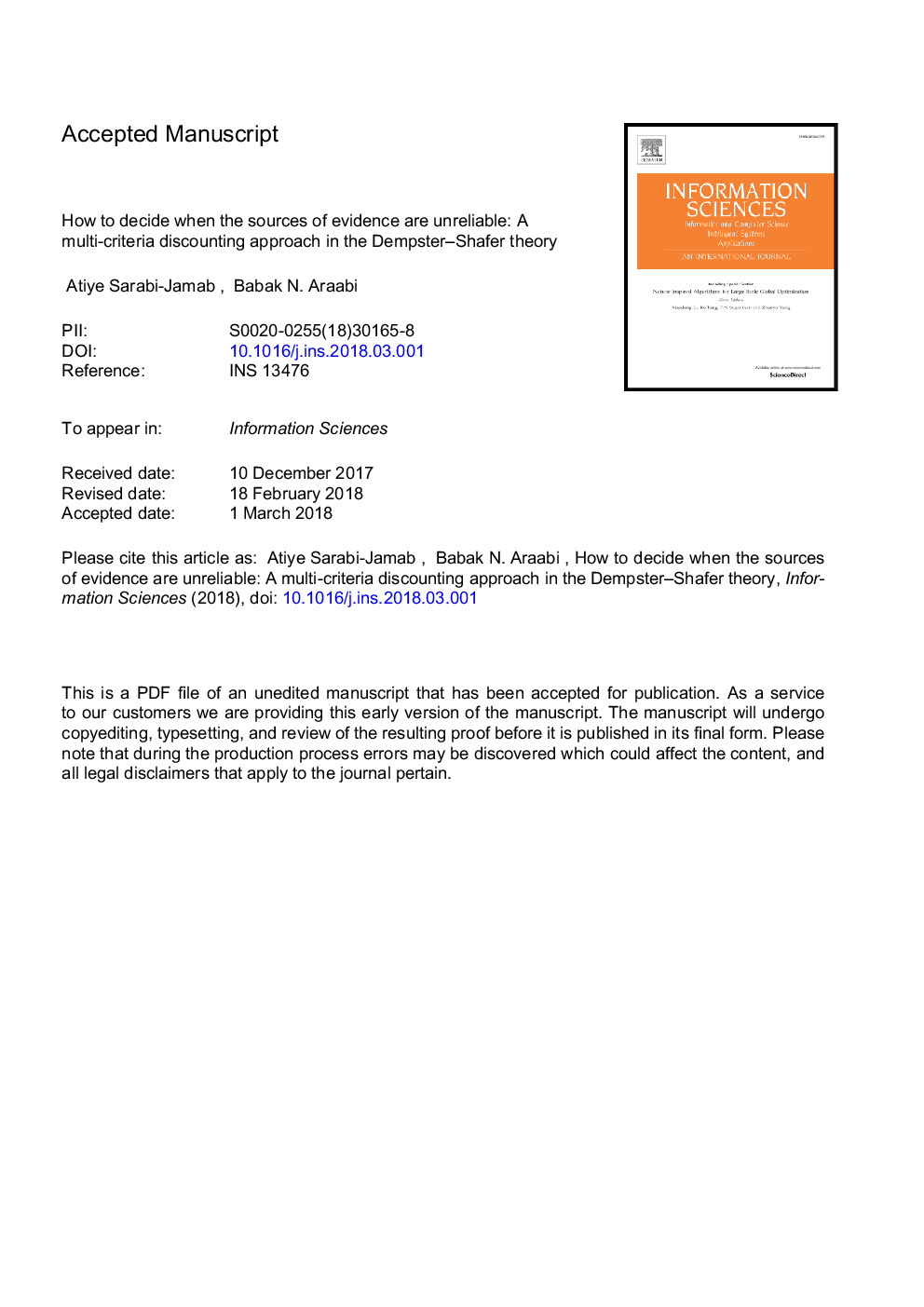| کد مقاله | کد نشریه | سال انتشار | مقاله انگلیسی | نسخه تمام متن |
|---|---|---|---|---|
| 6856492 | 1437959 | 2018 | 26 صفحه PDF | دانلود رایگان |
عنوان انگلیسی مقاله ISI
How to decide when the sources of evidence are unreliable: A multi-criteria discounting approach in the Dempster-Shafer theory
ترجمه فارسی عنوان
چگونگی تصمیم گیری در مورد زمانی که منابع شواهد غیر قابل اعتماد است: رویکرد تخفیف چند معیاره در نظریه دمپستر-شافر
دانلود مقاله + سفارش ترجمه
دانلود مقاله ISI انگلیسی
رایگان برای ایرانیان
کلمات کلیدی
تئوری شواهد دمپستر-شفر تابع باور، تلفیق اطلاعات، تخفیف فاکتور، برآورد پایایی منابع،
ترجمه چکیده
تئوری دمپستر-شافر اطلاعات اطلاعات نامشخص را مدیریت می کند و یک ابزار تلفیقی مفید برای تصمیم گیری ارائه می دهد. با این حال، کیفیت ترکیب با اطلاعات متناقض تحت تاثیر قرار می گیرد، به ویژه هنگامی که منابع شواهد غیر قابل اعتماد است. تعدادی از روشهای تخفیف منابع غیرقابل اعتماد شواهد پیشنهاد شده است. در این رویکردها، تخمین عوامل تخفیف بسیار مهم است، به ویژه اگر دانش قبلی در دسترس نباشد. اکثر روش های تخفیف فرض می کنند که فاصله بین اجزای شواهد تنها عامل برای برآورد درگیری است. با این حال، با توجه به تنها یک عامل به اندازه کافی قابل اعتماد برای ارزیابی درجه قابلیت اطمینان نیست، از آنجا که سردرگمی، اختلاف و ناقص اطلاعات ارائه شده از منابع شواهد به علت انواع مختلف درگیری است. در این مقاله، ما یک روش چند معیاره برای ارزیابی عوامل پایایی پیشنهاد کردیم. ما یک روش برای انتخاب یک مجموعه جامع از معیارها را تعیین کردیم که هر معیار به عدم اطمینان هر منبع شواهد مربوط می شود. سپس، ما روش ترکیبی برای ارزیابی درجه اطمینان ارائه کردیم. در نهایت، ما درجه اعتبار پیشنهاد شده ما را در یک روش تخفیف پی در پی گسترش دادیم. ما روش تخفیف پیشنهاد شده را از طریق دو آزمایش طراحی شده تأیید کردیم. نتایج نشان داد که رویکرد ما در تلفیق منابع غیرقابل اعتماد شواهد موثر بود. علاوه بر این، میزان اطمینان پیشنهادی ما بیشتر از روشهای قبلی در ردیفهای قویتر بود.
موضوعات مرتبط
مهندسی و علوم پایه
مهندسی کامپیوتر
هوش مصنوعی
چکیده انگلیسی
Dempster-Shafer theory manages uncertain information and offers a useful fusion tool for decision-making. However, the quality of combining is affected by conflicting information, especially when the sources of evidence are unreliable. A number of methods for discounting unreliable sources of evidence have been proposed. In these approaches, the estimation of the discounting factors is crucial, mainly when prior knowledge is unavailable. Most discounting methods assume that the distance between bodies of evidence is the only factor for conflict estimation. However, considering just one factor is not reliable enough to assess the reliability degrees, since the confusion, disparity, and imperfection of information provided by the sources of evidence are due to different types of conflict. In this paper, we proposed a multi-criteria method to estimate the reliability factors. We defined a method to select a comprehensive set of criteria, which each criterion takes into account the uncertainty of each source of evidence. Then, we proposed an aggregation method to estimate the reliability degree. Finally, we extended our proposed reliability degrees in a sequential discounting approach. We verified our suggested discounting method through two designed experiments. The results showed that our approach was efficient in combining the unreliable sources of evidence. Moreover, our proposed reliability degree was more robust in outliers than the previous methods.
ناشر
Database: Elsevier - ScienceDirect (ساینس دایرکت)
Journal: Information Sciences - Volumes 448â449, June 2018, Pages 233-248
Journal: Information Sciences - Volumes 448â449, June 2018, Pages 233-248
نویسندگان
Atiye Sarabi-Jamab, Babak N. Araabi,
